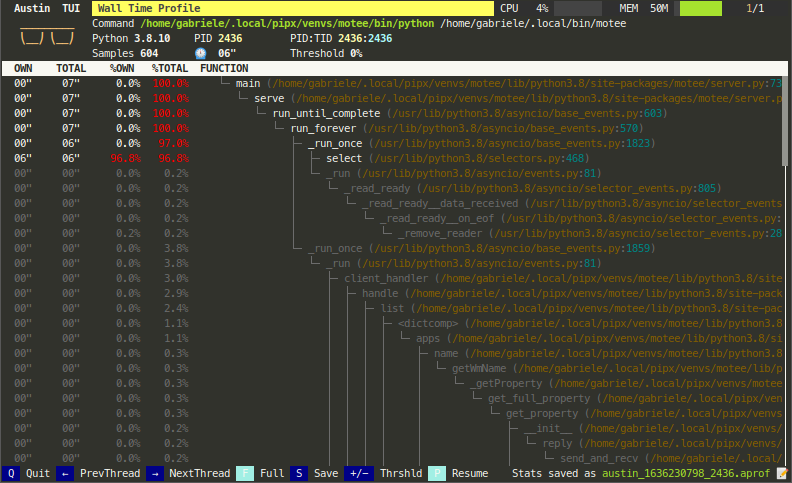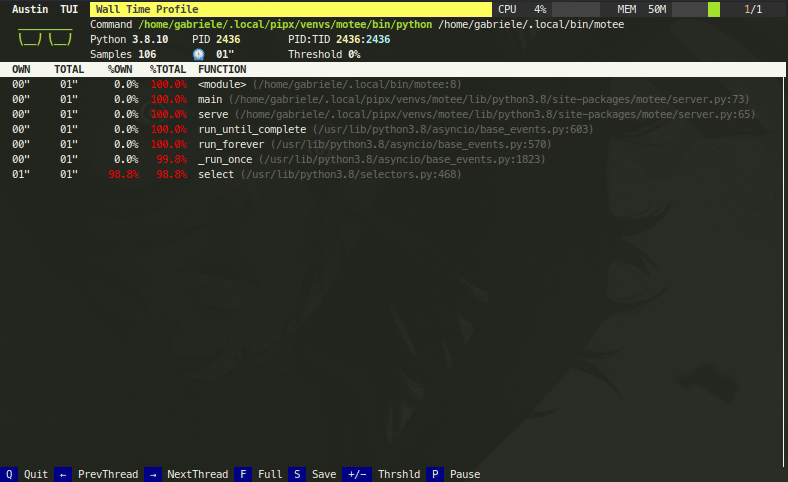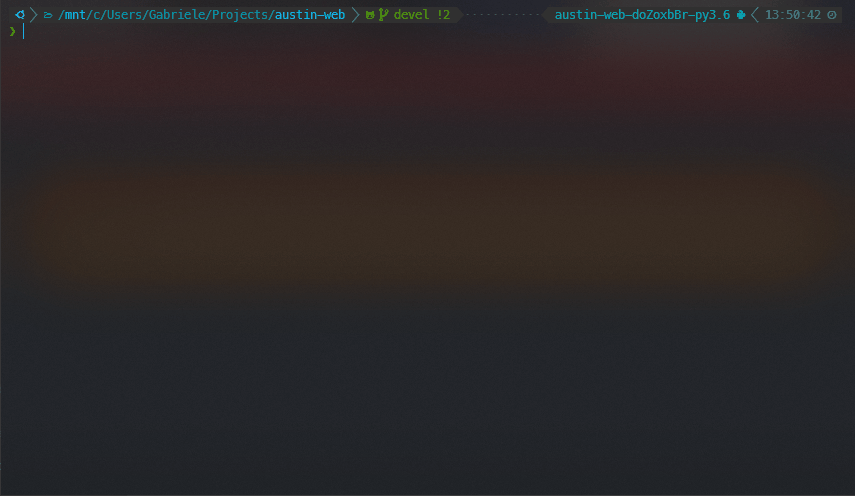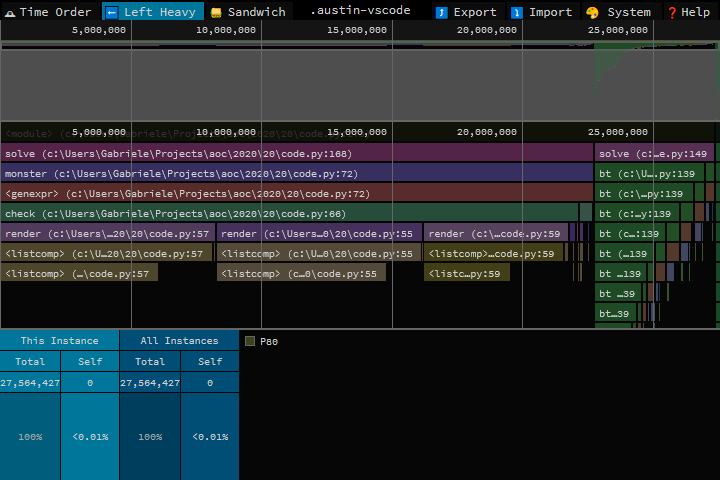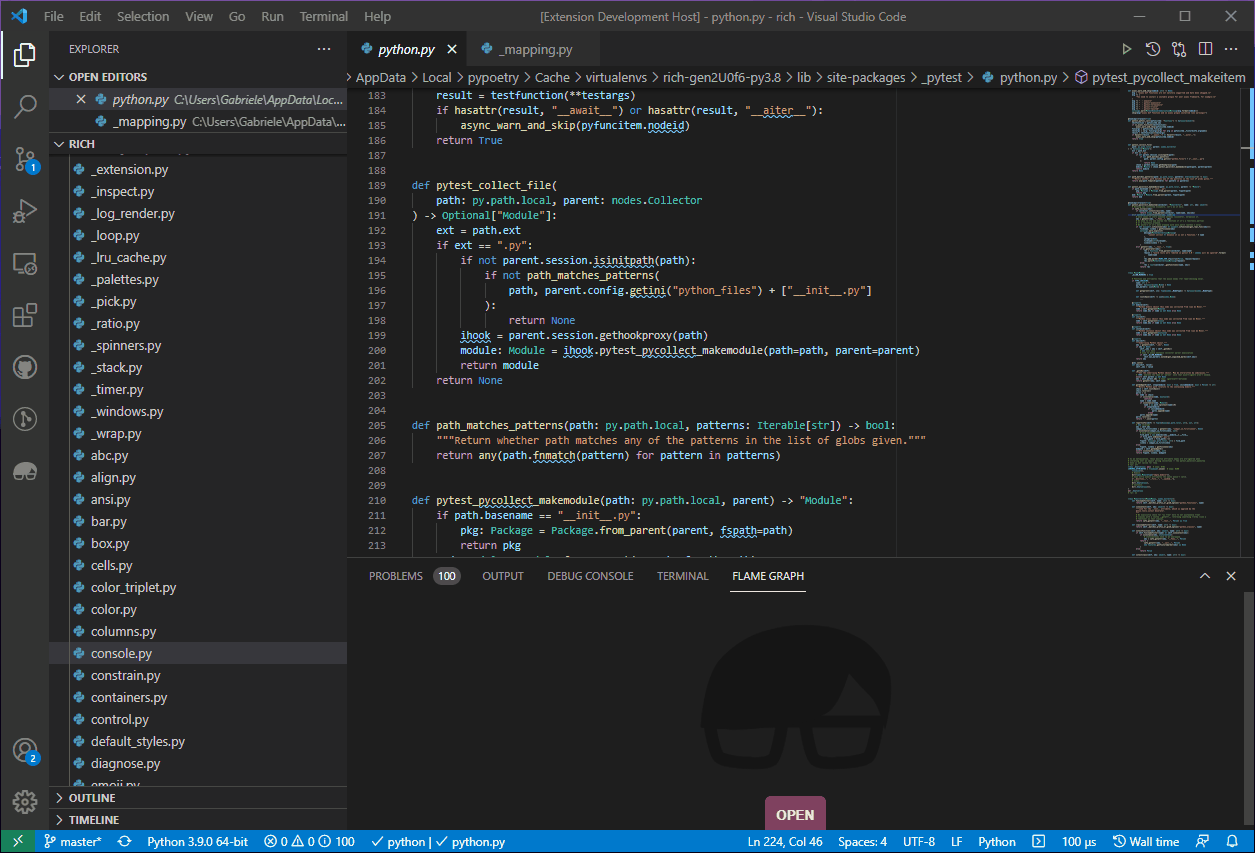P403n1x87 / Austin
Programming Languages
Labels
Projects that are alternatives of or similar to Austin
A Frame Stack Sampler for CPython
Synopsis •
Installation •
Usage •
Compatibility •
Why Austin •
Examples •
Contribute
This is the nicest profiler I’ve found for Python. It’s
cross-platform, doesn’t need me to change the code that’s being profiled, and
its output can be piped directly into flamegraph.pl. I just used it
to pinpoint a gross misuse of SQLAlchemy at work that’s run in some code at the
end of each day, and now I can go home earlier.
-- gthm on lobste.rs
If people are looking for a profiler, Austin looks pretty
cool. Check it out!
-- Michael Kennedy on Python Bytes 180
Synopsis
Austin is a Python frame stack sampler for CPython written in pure C. Samples are collected by reading the CPython interpreter virtual memory space in order to retrieve information about the currently running threads along with the stack of the frames that are being executed. Hence, one can use Austin to easily make powerful statistical profilers that have minimal impact on the target application and that don't require any instrumentation.
The key features of Austin are:
- Zero instrumentation;
- Minimal impact;
- Fast and lightweight;
- Time and memory profiling;
- Built-in support for multi-process applications (e.g.
mod_wsgi).
The simplest way to turn Austin into a full-fledged profiler is to combine it with FlameGraph or Speedscope. However, Austin's simple output format can be piped into any other external or custom tool for further processing. Look, for instance, at the following Python TUI
Keep reading for more tools ideas and examples!
Installation
Austin is available from the major software repositories of the most popular platforms. Check out the latest release page for pre-compiled binaries and installation packages.
On Linux, it can be installed using autotools or as a snap from the Snap
Store. The latter will automatically perform the
steps of the autotools method with a single command. On distributions derived
from Debian, Austin can be installed from the official repositories with
Aptitude. Anaconda users can install Austin from Conda Forge.
On Windows, Austin can be easily installed from the command line using either Chocolatey or Scoop. Alternatively, you can download the installer from the latest release page.
On macOS, Austin can be easily installed from the command line using Homebrew. Anaconda users can install Austin from Conda Forge.
For any other platform, compiling Austin from sources is as easy as cloning the repository and running the C compiler.
With autotools
Installing Austin using autotools amounts to the usual ./configure, make
and make install finger gymnastic. The only dependency is the standard C
library.
git clone --depth=1 https://github.com/P403n1x87/austin.git
autoreconf --install
./configure
make
make install
Alternatively, sources can be compiled with just a C compiler (see below).
From the Snap Store
Austin can be installed on many major Linux distributions from the Snap Store with the following command
sudo snap install austin --classic
On Debian and Derivatives
On March 30 2019 Austin was accepted into the official Debian repositories and
can therefore be installed with the apt utility.
On macOS
Austin can be installed on macOS using Homebrew:
brew install austin
From Chocolatey
To install Austin from Chocolatey, run the following command from the command line or from PowerShell
choco install austin
To upgrade run the following command from the command line or from PowerShell:
choco upgrade austin
From Scoop
To install Austin using Scoop, run the following command from the command line or from PowerShell
scoop install austin
To upgrade run the following command from the command line or from PowerShell:
scoop update
From Conda Forge
Anaconda users on Linux and macOS can install Austin from Conda Forge with the command
conda install -c conda-forge austin
From Sources without autotools
To install Austin from sources using the GNU C compiler, without autotools,
clone the repository with
git clone --depth=1 https://github.com/P403n1x87/austin.git
On Linux one can then use the command
gcc -O3 -Os -Wall -pthread src/*.c -o src/austin
whereas on macOS it is enough to run
gcc -O3 -Os -Wall src/*.c -o src/austin
On Windows, the -lpsapi switch is needed
gcc -O3 -Os -Wall -lpsapi src/*.c -o src/austin
Add -DDEBUG if you need a more verbose log. This is useful if you encounter a
bug with Austin and you want to report it here.
Usage
Usage: austin [OPTION...] command [ARG...]
Austin -- A frame stack sampler for Python.
-a, --alt-format Alternative collapsed stack sample format.
-C, --children Attach to child processes.
-e, --exclude-empty Do not output samples of threads with no frame
stacks.
-f, --full Produce the full set of metrics (time +mem -mem).
-i, --interval=n_us Sampling interval in microseconds (default is
100). Accepted units: s, ms, us.
-m, --memory Profile memory usage.
-o, --output=FILE Specify an output file for the collected samples.
-p, --pid=PID The the ID of the process to which Austin should
attach.
-s, --sleepless Suppress idle samples.
-t, --timeout=n_ms Start up wait time in milliseconds (default is
100). Accepted units: s, ms.
-x, --exposure=n_sec Sample for n_sec seconds only.
-?, --help Give this help list
--usage Give a short usage message
-V, --version Print program version
Mandatory or optional arguments to long options are also mandatory or optional
for any corresponding short options.
Report bugs to <https://github.com/P403n1x87/austin/issues>.
The output is a sequence of frame stack samples, one on each line. The format is
the collapsed one that is recognised by FlameGraph so that it can be piped
straight to flamegraph.pl for a quick visualisation, or redirected to a file
for some further processing.
By default, each line has the following structure:
P<pid>;T<tid>[;[frame]]* [metric]*
where the structure of [frame] and the number and type of metrics on each line
depend on the mode.
Normal Mode
When no special switch are passed to Austin from the command line, the process
identifier is omitted and [frame] has the structure
[frame] := <function> (<module>);L<line number>
The reason for not including the line number in the ([module]) part, as one
might have expected, is that this way the flame graph will show the total time
spent in each function, plus the finer detail of the time spent on each line. A
drawback of this format is that frame stacks double in height. If you prefer
something more conventional, you can use the -a option to switch to the
alternative format in which [frame] has the structure
[frame] := <function> (<module>:<line number>)
Each line then ends with a single [metric], i.e. the sampling time measured in
microseconds.
Memory and Full Metrics
When profiling in memory mode with the -m or --memory switch, the metric
value at the end of each line is the memory delta between samples, measured in
bytes. In full mode (-f or --full switches), each samples ends with three
values: the time delta, any positive memory delta (memory allocations) or zero
and any negative memory delta (memory releases) or zero.
NOTE The reported memory allocations and deallocations are obtained by computing resident memory deltas between samples. Hence these values give an idea of how much physical memory is being requested/released.
Multi-process Applications
Austin can be told to profile multi-process applications with the -C or
--children switch. This way Austin will look for new children of the parent
process.
Logging
Austin uses syslog on Linux and macOS, and %TEMP%\austin.log on Windows
for log messages, so make sure to watch these to get execution details and
statistics. Bad frames are output together with the other frames. In general,
entries for bad frames will not be visible in a flame graph as all tests show
error rates below 1% on average.
Compatibility
Austin supports Python 2.3-2.7 and 3.3-3.8 and has been tested on the following platforms and architectures
|
|
|
||
|---|---|---|---|
| x86_64 | ✓ | ✓ | ✓ |
| i686 | ✓ | ✓ | |
| arm64 | ✓ | ||
| ppc64le | ✓ |
* In order to attach to an external process, Austin requires the CAP_SYS_PTRACE
capability. This means that you will have to either use sudo when attaching
to a running Python process or grant the CAP_SYS_PTRACE capability to the Austin
binary with, e.g.
sudo setcap cap_sys_ptrace+ep `which austin`
In order for Austin to work with Docker, the --cap-add SYS_PTRACE option needs
to be passed when starting a container.
** Due to the System Integrity Protection introduced in MacOS with El
Capitan, Austin cannot profile Python processes that use an executable located
in the /bin folder, even with sudo. Hence, either run the interpreter from a
virtual environment or use a Python interpreter that is installed in, e.g.,
/Applications or via brew with the default prefix (/usr/local). Even in
these cases, though, the use of sudo is required.
NOTE Austin might work with other versions of Python on all the platforms and architectures above. So it is worth giving it a try even if your system is not listed below.
Why  Austin
Austin
When there already are similar tools out there, it's normal to wonder why one should be interested in yet another one. So here is a list of features that currently distinguish Austin.
-
Written in pure C Austin is written in pure C code. There are no dependencies on third-party libraries with the exception of the standard C library and the API provided by the Operating System.
-
Just a sampler Austin is just a frame stack sampler. It looks into a running Python application at regular intervals of time and dumps whatever frame stack it finds. The samples can then be analysed at a later time so that Austin can sample at rates higher than other non-C alternative that also analyse the samples as they run.
-
Simple output, powerful tools Austin uses the collapsed stack format of FlameGraph that is easy to parse. You can then go and build your own tool to analyse Austin's output. You could even make a player that replays the application execution in slow motion, so that you can see what has happened in temporal order.
-
Small size Austin compiles to a single binary executable of just a bunch of KB.
-
Easy to maintain Occasionally, the Python C API changes and Austin will need to be adjusted to new releases. However, given that Austin, like CPython, is written in C, implementing the new changes is rather straight-forward.
Examples
The following flame graph has been obtained with the command
austin -i 1ms ./test.py | ./flamegraph.pl --countname=μs > test.svg
where the sample test.py script has the following content
import psutil
for i in range(1000):
list(psutil.process_iter())
To profile Apache2 WSGI application, one can attach Austin to the web server with
austin -Cp `pgrep apache2 | head -n 1`
Any child processes will be automatically detected as they are created and Austin will sample them too.
Austin TUI
The Austin TUI is a text-based user interface for Austin that gives you a top-like view of what is currently running inside a Python application. It is most useful for scripts that have long-running procedures as you can see where execution is at without tracing instructions in your code. You can also save the collected data from within the TUI and feed it to Flame Graph for visualisation, or convert it to the pprof format.
If you want to give it a go you can install it using pip with
pip install austin-tui --upgrade
and run it with
austin-tui [OPTION...] command [ARG...]
with the same command line as Austin. Please note that the austin binary
should be available from within the PATH environment variable in order for the
TUI to work.
The TUI is based on
python-curses. The version included with the standard Windows installations of Python is broken so it won't work out of the box. A solution is to install the the wheel of the port to Windows from this page. Wheel files can be installed directly withpip, as described in the linked page.
Austin Web
Austin Web is a web application that wraps around Austin. At its core, Austin
Web is based on d3-flame-graph to display a live flame graph in the browser,
that refreshes every 3 seconds with newly collected samples. Austin Web can also
be used for remote profiling by setting the --host and --port options.
If you want to give it a go you can install it using pip with
pip install austin-web --upgrade
and run it with
austin-web [OPTION...] command [ARG...]
with the same command line as Austin. This starts a simple HTTP server that
serves on localhost by default. When no explicit port is given, Austin Web
will use an ephemeral one.
Please note that the austin binary should be available from within the PATH
environment variable in order for Austin Web to work.
Speedscope
Austin output is now supported by Speedscope. However, the austin-python
library comes with format conversion tools that allow to convert the output from
Austin to the Speedscope JSON format.
If you want to give it a go you can install it using pip with
pip install austin-python --upgrade
and run it with
austin2speedscope [-h] [--indent INDENT] [-V] input output
where input is a file containing the output from Austin and output is the
name of the JSON file to use to save the result of the conversion, ready to be
used on Speedscope.
Google pprof
Austin's format can also be converted to the Google pprof format using the
austin2pprof utility that comes with austin-python. If you want to give it
a go you can install it using pip with
pip install austin-python --upgrade
and run it with
austin2pprof [-h] [-V] input output
where input is a file containing the output from Austin and output is the
name of the protobuf file to use to save the result of the conversion, ready to
be used with Google's pprof tools.
IDE Extensions
It is easy to write your own extension for your favourite text editor. This, for example, is a demo of a Visual Studio Code extension that highlights the most hit lines of code straight into the editor
Contribute
If you like Austin and you find it useful, there are ways for you to contribute.
If you want to help with the development, then have a look at the open issues and have a look at the contributing guidelines before you open a pull request.
You can also contribute to the development of the Austin by becoming a sponsor and/or by buying me a coffee on BMC or by chipping in a few pennies on PayPal.Me.










